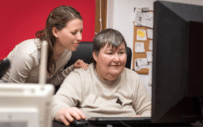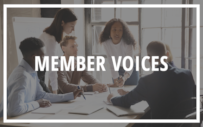
To foster a truly diverse and inclusive workplace, employers should expand their DEI efforts to encompass what is increasingly being referred to as DEIA—or diversity, equity, inclusion, and accessibility.

As October is National Disability Employment Awareness Month, several organization offer resources about disability inclusion for employers and career services offices to use now and throughout the year.

A NACE task force developed a glossary of terms relevant to supporting individuals with disabilities.

This list, compiled by a NACE task force, offers information about and links to a variety of resources.

College students with disabilities struggle to launch their careers. Strategic partnerships can help reduce barriers and increase opportunities.

Students with disabilities face a number of barriers to successful employment, but tend to underuse career services. The authors address options and opportunities for career services to address underuse and help their students overcome obstacles and challenges.

The College Autism Network helped create a curriculum to help career services professionals better converse about autism and support autistic students.

Employers that recruit and hire students with autism can overcome barriers by being proactive in seeking resources and information about this student population.

Recruiting, onboarding, and retaining employees are not one-size-fits-all processes and there are challenges throughout. This is especially true for neurodiverse students.

To get the best results when recruiting and hiring neurodiverse candidates, employers need to be flexible, supportive, and willing to make accommodations.

Work-based learning opportunities can be great ways for students with disabilities to gain valuable professional experience while preparing for their postgraduation careers.